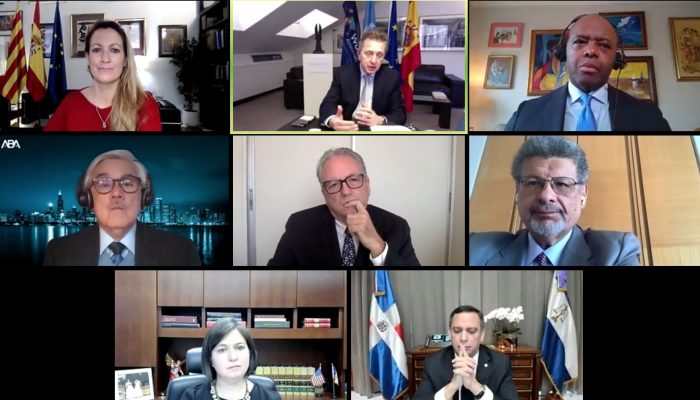The World Jurist Association (WJA) celebrated the Opening Session Regensburg “Rule of Law as a Universal Principle” in which the conception and perception of this concept from different countries were analyzed and shared. Leading academic jurists from Germany, Slovakia, Japan, Peru and Romania gathered to give their vision of the Rule of Law.
Diego Solana, program coordinator of the World Law Congress Colombia 2021, opened the meeting stating that “the rule of law is the best safeguard against tyranny, dictatorship and arbitrariness”. As moderator of the debate, Rainer Arnold, professor at the University of Regensburg, acknowledged that “public authorities are bound to the rule of law, and a State can only be a real democracy if it is governed by the law”. He further stated that the rule of law “promotes constitutional justice and implies a universal value”, adding that “freedom, by nature, is linked to human dignity, and the restriction of freedoms must be an exception that requires legitimization”.
For her part, Simina Tanasescu, professor at the University of Bucharest and judge of the Constitutional Court of Romania, referred to the citizens: “we must not forget that the rule of law does not only mean separation of powers, but above all it refers to the human being, their dignity and the fundamental rights they have”. She stressed that “as long as we have this as our main focus, we will be able to overcome the bad intentions against the rule of law”.
On the balance of powers, César Landa, trustee of the World Law Foundation and professor at the Pontifical University of Peru, stressed the “need to exercise the control of powers between the government and the opposition” and explained the situation in his country: in Peru, “this control has shown the need for an update of the Constitution, given the exhaustion of its political and socioeconomic model, as shown by the four changes of president in five years”. He also pointed out that “democracy must exist with the support of law, and there are no rights without democracy”.
Continuing with the independence of powers, Milan Kristof, référendaire at the Court of Justice of the European Union, pointed out that “the council of the judiciary can constitute a safeguard for legal independence, being independent of the legislature and also of the executive”. In this regard, he stressed that “when the Court of Justice finds a breach of obligations, the Member State of the European Union concerned must take the necessary measures to rectify the situation”.
Japanese professor Hiroshi OTSU, from the University of Meji – Tokyo, explained what is happening in Japan, where they are witnessing “the emergence of a new rule of law that involves a dialogue between the national and local legislative power, as well as between the regulatory authority and the regulated parties”.
This was the fourteenth opening session of the upcoming World Law Congress. The in-person event will be held in Barranquilla, Colombia, on December 2 and 3. For in-person and online registration to the World Law Congress Colombia 2021 visit www.worldlawcongress.com.

